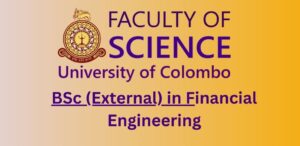 The Bachelor of Science in Financial Engineering (external) degree program focuses on the creation of new financial strategies and tools that are used to forecast financial trends, develop financial instruments / models, and establish new methods that are beneficial to businesses and organizations that are attempting to make strategic financial decisions. Students who pursue this degree will acquire fundamental knowledge in the areas of mathematics, statistics, languages, and computers, as well as the fundamentals of economics and accounting, quantitative methods, statistical finance, financial modeling, handling risks, corporate finance, professional development in finance, and practices in finance.
The Bachelor of Science in Financial Engineering (external) degree program focuses on the creation of new financial strategies and tools that are used to forecast financial trends, develop financial instruments / models, and establish new methods that are beneficial to businesses and organizations that are attempting to make strategic financial decisions. Students who pursue this degree will acquire fundamental knowledge in the areas of mathematics, statistics, languages, and computers, as well as the fundamentals of economics and accounting, quantitative methods, statistical finance, financial modeling, handling risks, corporate finance, professional development in finance, and practices in finance.
Admission Requirements:
GCE Advanced Level Examination (local) – Three passes in one sitting in the Mathematics/ Biology/ Commerce Streams (Preference will be given to those who have done Mathematics/ Combined Mathematics/ Higher Mathematics) OR GCE Ordinary Level Examination (local) – Two passes in one sitting in the Mathematics/ Biology/ Commerce Streams (Preference will be given to those who
Either a curriculum that is equivalent to the local GCE Advanced Level Examination and includes mathematics as a topic (for example, Edexcel, London A/L, Cambridge A/L, etc.) OR a curriculum that includes mathematics as a subject.
Any other academic or professional qualification that is considered to be equal and is acceptable by the faculty and the senate.
Duration of Financial Engineering Program:
The length of time for participation in the program is three years. The program is broken up into two halves that each last a total of ten months and are called semesters. Blended learning is the delivery method for these classes. On the weekends, absolutely all of the classes and discussions take place online (Saturday for two hours, and Sunday for the entire day).
Rationale:
The push toward the expansion and development of the financial market emphasizes the need for individuals who are able to recognize, assess, forecast, distribute, and deliver integrated solutions to fulfill the requirements of the financial sector. Within the realm of contemporary banking and financing, “Financial Engineering” remains one of the subfields that is experiencing the most rapid expansion. This fascinating field continues to serve as the driving force behind the creation of new mathematical models and the subsequent development of associated computing systems. This is due, in part, to the intricacy and complexity of modern financial products. Despite its short age, the field of financial mathematics has already grown into a significant body of knowledge and an established element of mathematical science. In order to meet the demand for knowledge in the forward momentum toward financial expansion and development, the proposed change has been designed.
The course is organized in such a way that it will facilitate all part-time, external students’ continued engagement with the Lecturers in the many course modules. A learning management system, often known as an LMS, is typically employed in the capacity of an assessment and evaluation mechanism for independent study.
Students will be prepared for a variety of occupations in the field of financial analysis, both locally in Sri Lanka and abroad, by taking the intellectually stimulating and practically relevant Finance course. Students who get a degree in Financial Engineering are equipped with the knowledge and skills essential not just for economic analysis, financial forecasting, and financial practice, but also for financial consultancy, financial counseling, and financial product development/analysis.
Program Evaluation:
Written examinations and/or assignments will be used, depending on the circumstances, to assess students’ mastery of the theoretical course modules. The laboratory course modules will be evaluated based on the completion of assignments and/or tests at the end of the semester. A mixed-mode evaluation that includes continuous assessments can be required for certain course units under certain circumstances. The requirements for level certificates, diplomas, advanced diplomas, and degrees can all be found in the section under “Degree-Awarding Criteria.”
Contact Details:
Coordinator
Prof. Sanjeewa Perera
bscfe@sci.cmb.ac.lk
071-535 2616
University of Colombo
Cumarathunga Munidasa Mawatha
Colombo 00300, Sri Lanka